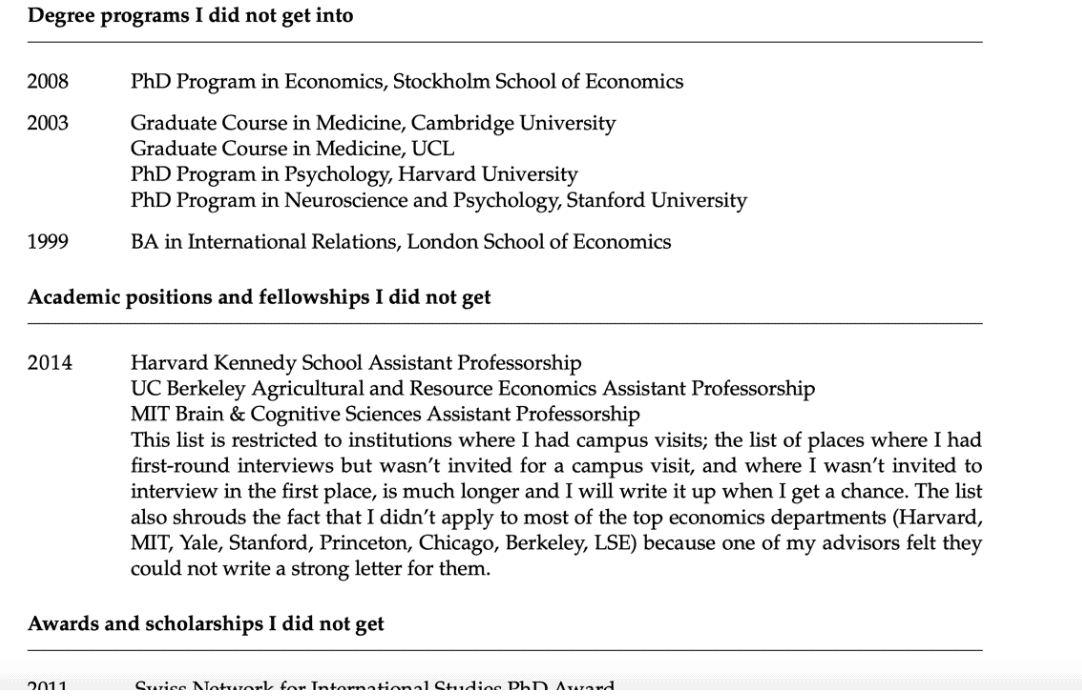Today we’re talking about failure, and why it’s not the worst thing to happen to someone. Yes, to experience failure is not the most pleasant of experiences – but we measure our failures against our successes, so what are successes without failures, and vice versa? After moments of failure, our future successes can feel far more invigorating and well-earned than before. We should normalise failure in order to enjoy success at its best – and as Professor Johannes Haushofer demonstrates, there’s nothing wrong with documenting failures too!

Our Perception Of Failure Matters
There is this general notion we are fed when we are young that failing is bad, to the point that it becomes inherently tied to us and our own perceptions of our capabilities. When we fail, the typical method of improvement is to ‘just reflect and avoid the same mistakes next time’’ And while this can work, failures are dependent on various factors: our workload, organisational skills, mental wellbeing and much more. So keep in mind that a failure is not reflective of your personal ability by any means. Learn from it, but don’t beat yourself up over it.
Understanding Our Failures
As the Harvard Business Review explains, there is a drastic difference between genuine failures that are treated as blameworthy (that are not actually blameworthy), and those that are genuinely blameworthy (like sleeping in late just because you can). No learning is completed if we don’t understand the reasons for our own failures – factors that are materially identifiable, that we can individually tackle in other trajectories of life. Learning is much more than just experiencing failure – it is about being able to translate these failures into self-realisation and motivation towards success.

Embracing Your Failures
Seems impossible, right? But like complex mechanics of a company or business, there are patterns that can suggest negative or positive projections of our future successes. We have the valuable ability to step back, watch a dip happen, and mediate methods to provide catalysts for a recovery peak. We must understand that failure is a tool for future triumphs – not just a warning sign of a decline. The most valuable of insight can come from a failure!
Make Your Own CV Of Failures
This is where Professor Johannes Haushofer comes in. Haushofer is a professor at Princeton University. To embrace the significance of his moments of failure, he created the astonishing, ‘My CV of Failures’ and shared it online; it soon went viral, with many calling him an inspiration. In this document, he lists all of the jobs and opportunities he didn’t attain, the awards and scholarships he didn’t get, and more. He expresses the idea that we internalise the effect of our failures, which causes us to directly attribute failures to ourselves as people (‘failures are often invisible… successes are visible’). In contrast, successes are the thing we love to share and show to everyone, because they are the mediators of praiseworthy action. But failures are not defining characteristics of our personalities, and him sharing his CV of failures was to emphasise on how despite all his failings, he still reached the success he’s at today.
Instead of running away from moments of failure, Haushofer tells us to embrace and foster their occurrence. They are important to reflect upon in our futures, for pride, for humility and for the importance of the learning process.

Understanding Reality And Maintaining Self-Belief
Often when we experience failure, our attention is just brought to the shame that comes with it. You have to consider contextual factors; maybe ones that weren’t even in your control. Yes – you may have hoped you were going to get the job or the internship. And maybe to employers your resume was excellent. But there are almost always alternative factors that can lead to failure, even if your attempt was excellent. As the University of Pennsylvania reiterates to its readers, ‘hope is not a plan’. Plan your future on the basis of realistic factors (of what you know about future opportunities). When we say move forward, we refer to the most important subject of all: keeping your motivation amid moments of failure.
Keep The Determination
The beauty of failures and successes? In many circumstances, they are entirely unpredictable. Nevertheless, fear of the unknown is a common symptom of this double-edged sword, and in the process, your anxiety can start to build. In order to avoid the the nail-biting meltdowns, mentally isolate your failures and successes (just like we saw on the CV). Treat each attempt you make as a circumstantial choice that you decided to pursue on that day and at that time. If you are consistently failing, your first port of call should not be to label yourself a complete failure. Sometimes, you can’t find the motivation to continue pursuing success – and that’s okay. Instead, keep your focus on finding methods of improvement. As you slowly practice methods for picking yourself back up, and improving the quality of the work at hand, success will be in reach.








What do you think?
You must be logged in to post a comment.